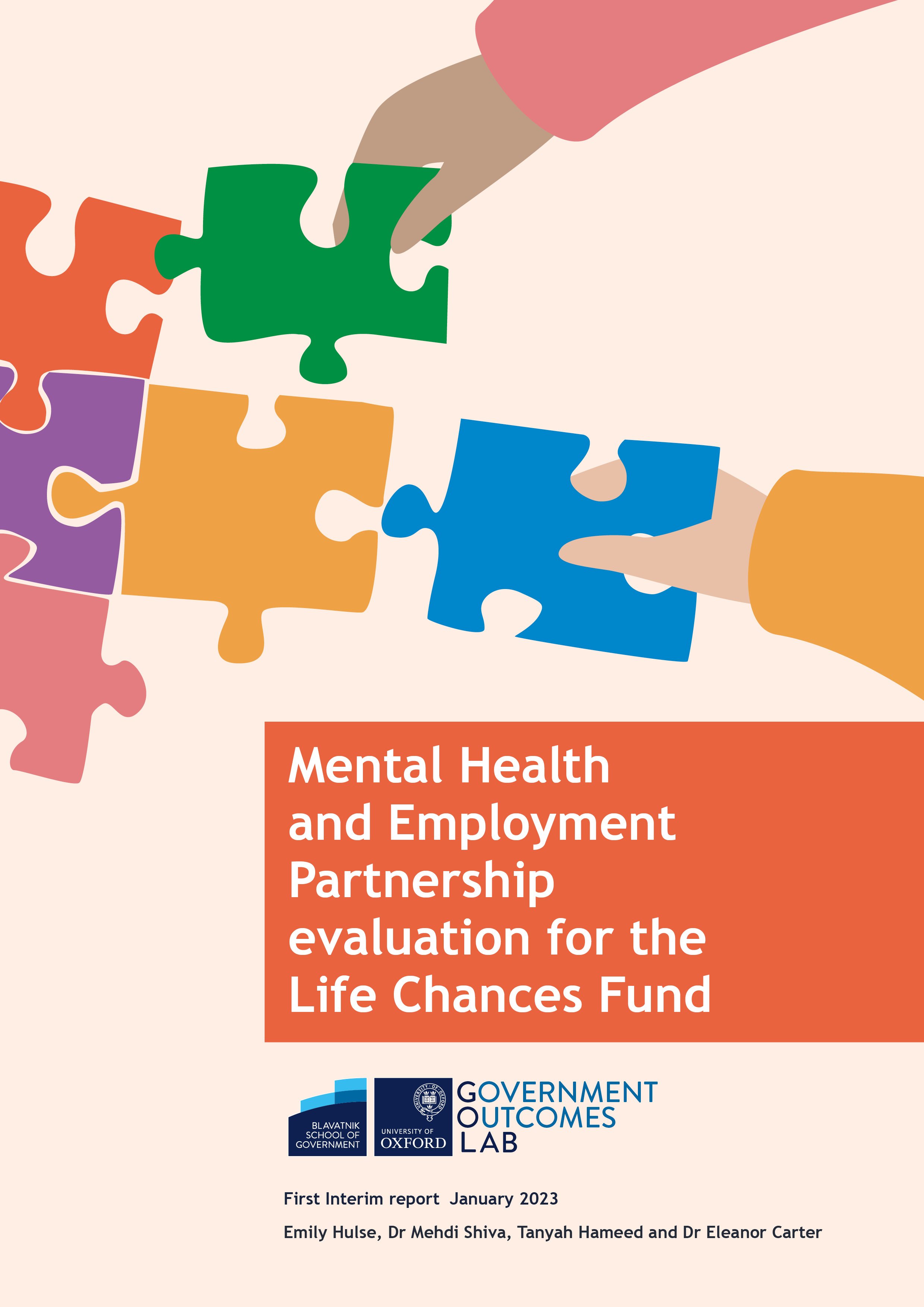Insights and Lessons from MHEP LCF Evaluation's First Interim Report
Set my timezone
Select a timezone from the map or dropdown and click the Set timezone button to adjust the event date/times to your current timezone.

Join us for an in-depth discussion on the ground-breaking insights and lessons from Mental Health and Employment Partnership (MHEP) LCF Evaluation's First Interim Report.
Engaging with Evidence is a series of interactive online convenings hosted by the Government Outcomes Lab (GO Lab) and designed to encourage a greater understanding of the latest evidence on the use of cross-sector partnerships focused on outcomes. The sessions are hosted monthly, and attract a diverse range of practitioners from different sectors, as well as researcher from across the world.
Building independent, high-quality evidence
At the GO Lab, we believe in the importance of building independent, high-quality evidence and disseminating it effectively to inform policy decisions and improve practice on the ground. As new evidence around the use of outcomes-based approaches is starting to emerge, we hope that with this series of online convenings we can continue to bridge the gap between evidence and practice, and help foster real dialogue between policymakers, practitioners and researchers in an honest, transparent and constructive way. Both veterans and explorers interested in better understanding the latest evidence around the use of outcomes-based approaches are welcome to join these sessions.
Throughout 2023, Engaging with Evidence will offer an open platform for policymakers, practitioners and researchers around the world to engage with key findings from the latest research and evaluation work in the field. They will have the opportunity to discuss new evidence directly with the authors of research and evaluation studies, hear the practical insights of the partners involved in the development and implementation of the projects under discussion, and reflect on the relevance of the evidence to their own work.
What to expect
Each session lasts 90 minutes and features contributions from a diverse panel of experts, as well as ample time for contributions and questions from all participants. Discussions at each session are grounded in the findings of a recent evaluation or research study, with additional practical insights brought in by stakeholders directly involved in the work or project under discussion. Each session follows a set format:
- Setting the context & presentation of the evaluation/ research findings
- Discussion with the panel and audience questions
- Closing remarks
If you’d like to suggest a topic or highlight a recent study that you’d like to see discussed on a future session, please contact our moderator Srinithya Nagarajan
Session recording
Listen to the audio recording of the session.
Session overview
In this session, we explored the latest findings from the first interim report of the Mental Health and Employment Partnership (MHEP) evaluation for the Life Chances Fund (LCF).
Alongside one of the authors of the report, Emily Hulse, Research Associate at the Government Outcome Lab, and Sarah Baillie, Manager at Social Finance, we were joined by leading experts in the field with our guest speakers, the theories of change and contextual factors (barriers and facilitators) which serve as external influences on the MHEP projects, the distinctive contribution of MHEP and the benefits that the evaluation design choices can bring to the projects. We also reflected on the performance data of the key outcome metrics of MHEP projects and the wider applicability of the lessons to employment support for those who face the greatest barriers to labour market inclusion.
The Life Chances Fund is a £70 million outcomes fund to support locally commissioned social impact bonds (SIBs), launched by the Department for Digital, Culture, Media & Sport (DCMS) in 2016. There are 5 Mental Health and Employment Partnership (MHEP) SIBs contracted under the LCF. MHEP was established in 2015 to drive expansion of high-quality employment support programmes, based on the Individual Placement and Support (IPS) model, for people with mental health issues. It is a special purpose vehicle run by Social Finance, backed by investment from Big Issue Invest. The first report adopts a mixed methods approach, drawing on qualitative interview data and aggregate quantitative performance data.The evaluation of the MHEP is being undertaken by the Government Outcomes Lab.
During our session, we explored the lessons and insights from the first Interim Report of MHEP evaluation. There were three main mediating mechanisms which may explain how MHEP provides additional value compared to traditional commissioning:
1) Additional financial and human resources
MHEP was able to unlock additional funding for projects through the Life Chances Fund. This was understood to bring additional financial and human resources.
2) Additional performance management function
MHEP provided a dedicated performance management function that was seen to drive an additional focus on achieving outcomes, supported by data analysis and intelligence.
3) Collaborative working
MHEP supported a more intentional, collaborative working culture within each local partnership. MHEP represented a “three-way partnership” with a sense of shared purpose, and despite requiring considerable work, this was viewed as hugely beneficial.